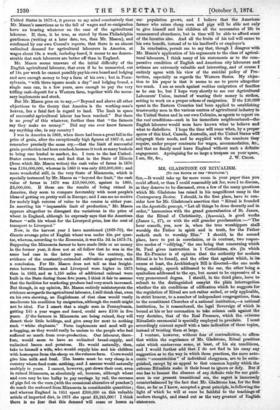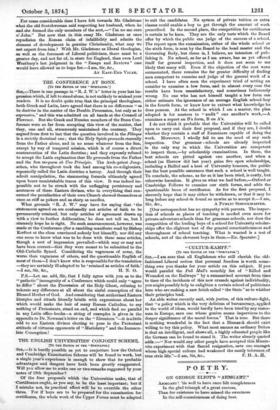MR. GLADSTONE ON RITUALISM.
[TO THE F.Drros OF THS SPECTATOR:1 Stn,—It would take up far more room in your paper than you could afford, or than I could reasonably ask for, were I to discuss, as they deserve to be discussed, even a few of the many questions. which Mr. Gladstone has raised in his magnificent essay in the- Contemporary Review. I should, in the first place, have to con- sider how far Mr. Gladstone's assertion that " Ritual is founded on the Apostolic precept, "Let all things be done decently and in. order," harmonises with the grand generalisation of St. James, that the Ritual of Christianity, (Opncoci(ec), is good works. (James i., 27), or with the still grander proclamation :—" The hour cometh, yea, now is, when the true worshippers shall worship the 'Father in spirit and in truth, for the Father- seeketh such to worship Him." I should, in the second place, have to put in correlation, or in contrast, two respec- tive modes of "edifying," the one being that concerning which St. Paul gives instruction in 1 Corinthians, xiv. (in which the Ex-Premier is of opinion that the authority for modern. Ritual is to be found), and the other that against which, in its excess at least, the Archbishop's Bill is directed—the one mode being, mainly, speech addressed to the ear, the other being a. symbolism addressed to the eye, but meant to be expressive of a. very pronounced dogma. I should, in the third place, have to• submit to the distinguished essayist the plain interrogation whether the six conditions of edification which he suggests for the regulation of Ritual are not rather suited, or only applicable, in strict honour, to a number of independent congregations, than
the constituent Churches of a national institution,—a national institution, be it remembered, the legal Sovereign of which is- bound at his or her coronation to take solemn oath against the very doctrine, that of the Real Presence, which the extreme Ritualistic ceremonial is specially employed to proclaim. I must accordingly content myself with a bare indication of these topics, instead of treating them at large.
I venture, however, without fear of contradiction, to affirm that within the cognisance of Mr. Gladstone, Ritual practices exist which contravene some, at least, of his six conditions, and I would further add that I do not find in his essay any suggestion as to the way in which these practices, the mere auto- cratic " eccentricities " of individual clergymen, are to be extin- guished, except by an appeal to that common loyalty which the extreme Ritualists make it their boast to ignore or defy. But if one has to lament the absence of any definite rule for our guid- ance in our present transitional era, the regret is immensely counterbalanced by the fact that Mr. Gladstone has, for the first time, so far as I know, accepted a great principle, in following the light of which he will at once be faithful to the teachings of modern thought, and stand out as the very greatest of English: statesmen.
For some considerable time I have felt towards Mr. Gladstone what the old Scotchwoman said respecting her husband, when, he and she formed the only members of the sect,—" I'm no sae sure -o' John." But now that in this essay Mr. Gladstone at once repudiates the Roman claim of infallibility and admits the element of development in genuine Christianityy, what may we not expect from him ? With Mr. Gladstone as liberal theologian, as well as the foremost of Liberal politicians, there must be a greater day, and not far of, in store for Fngland, than even Lord Westbury's last judgment in the " Essays and Reviews " case would have allowed us to hope for.—I am, Sir, &c., AN EAST-END VICAR..



































 Previous page
Previous page